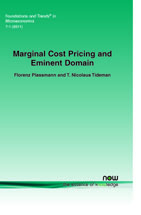Marginal Cost Pricing and Eminent Domain
By Florenz Plassmann, Department of Economics, Binghamton University, USA, fplass@binghamton.edu | T. Nicolaus Tideman, Department of Economics, Virginia Tech, USA, ntideman@vt.edu
Abstract
There are three separate strands of literature in economics that are related to the efficiency of takings under eminent domain: one addresses the question of optimal compensation for properties that are taken, the second inquires how governments might learn the values of properties that they consider taking, while the third analyzes solutions to the problem of land assembly. This essay reviews these strands of literature and argues that the principle of marginal cost pricing can be used as a unifying principle for integrating them.
Marginal Cost Pricing and Eminent Domain
Marginal Cost Pricing and Eminent Domain examines proposals for making government takings more efficient as well as more equitable to owners. It integrates the economics of takings with the hitherto separate literature on land assembly and the associated literature on self-assessment that analyzes ways of providing owners with the incentive to reveal their valuations of their properties. The organizing principle is the basic economic insight that socially efficient behavior generally results from marginal cost pricing-the requirement that every person or other economic entity bear the full marginal costs of his or its actions. Following the introduction, section 2 describes the general framework. Section 3 examines the literature on efficient investment decisions when there is a possibility that the government might take the associated properties in the future. Sections 4 and 5 consider the case when property values are not easily observable – section 4 surveys several mechanisms that provide owners with the incentive to reveal their subjective valuations of their properties and section 5 addresses the situation in which either the government or a private developer seeks to assemble properties owned by multiple persons. The authors conclude in section 6 and include a full set of references of this literature.
